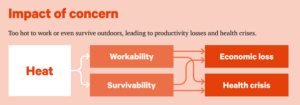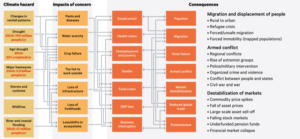Here’s my interpretation of our future according to Chatham House’s report entitled Climate change risk assessment 2021. Chatham House, (yes, they do more than set rules for disclosure at meetings), published the report in September with its headline findings that:
- The world is dangerously off-track to meet the Paris Agreement goals
- The risks are compounding, and
- Without immediate action, the impacts will be devastating in the coming decades
Doomerism
There is some chatter in climate circles that we must put a positive spin on the climate situation we find ourselves in. The theory is that if we admit how bad things are then we will be so despondent that we will just fail to make any changes.
I believe we must know where we are now in order to understand the magnitude of the task and the timelines for action. Ignoring the evidence risks burying our collective heads in the sand and not addressing the issue with the fervor it requires.
Discussions around Climate
A lot of the media conversation around climate action poses the costs of mitigating and adapting to the climate crises against a fictional alternative of business as usual with no climate crises or associated costs. This is at best misguided.
This report sets out the current trajectory in terms of projected emissions and delves into the implications of the consequent temperature rises.
The findings are frightening.
How hot will it get?
On the basis of countries meeting their Nationally Determined Contributions (NDCs) we are aiming for a 2.7-degree rise by 2100, with a 10% chance of a rise greater than 3.5 degrees C.
Compare that to the less than 1% chance of keeping below 1.5 degrees the Paris Agreement target.
And as Ireland knows (to its shame), not all countries can be relied upon to meet their decarbonization targets.
What are the impacts?
The impacts of business as usual are water scarcity, pests, and diseases, crop failure, loss of ecosystems, and loss of infrastructure and livelihoods.
The images below are taken from the Climate change risk assessment 2021 Summary of research findings
Heat
Globally, each year in the 2030s:
- More than 400 million people a year are likely to be exposed to temperatures exceeding the workability threshold (unable to work outdoors).
- More than 10 million people a year are likely to be exposed to heat stress exceeding the survivability threshold (likely to die outside).
Drought
We have already seen droughts and heatwaves cause 20-50% losses in production. However, the impact is limited because drought only happens sporadically and production is distributed across the globe. A synchronous >10 per cent yield loss in the top four maize-producing countries would have devastating impacts on availability and prices. Currently, there is a near-zero chance of this happening. Over the decade of the 2040s, the risk of this increases to just under 50 per cent.
Water scarcity
By 2040, almost 700 million people each year will likely be exposed to prolonged severe droughts of at least six months duration. The severity and length of these future droughts are at least as bad as the first wave (1934) of the US Midwest ‘dust bowl’ drought of the 1930s.
What are the consequences?
The consequences of the impacts are food crises, health crises, social unrest, and state failure. The resulting armed conflict between people and states, business interruption, and market destabilization will be devastating and are largely avoidable.
So, when considering the costs of climate actions ask yourself, what is the alternative scenario against which this is being compared? Because the past is gone and the business-as-usual future is frightening, dangerous, and costly.
You can read the report here – https://www.chathamhouse.org/2021/09/climate-change-risk-assessment-2021













